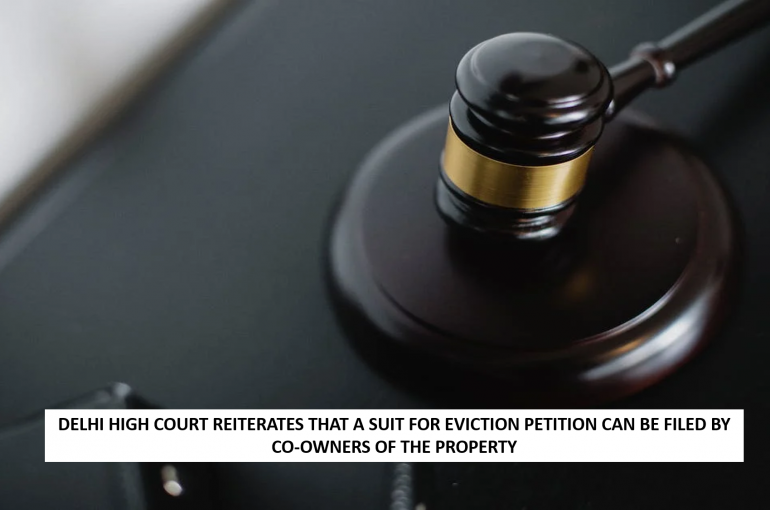DELHI HIGH COURT REITERATES THAT A SUIT FOR EVICTION PETITION CAN BE FILED BY CO-OWNERS OF THE PROPERTY
Recently, a single Judge Bench of the Delhi High Court comprising of Justice Sachin Datta passed a Judgment dated 11.01.2023 in DHARAM VEER GOEL vs RENU JAIN & ANR, in RC.REV. 118/2022, and held that that the co-owners of a property can file a suit for eviction of a tenant residing in the said property that belongs to all the owners and co-owners.
FACTS
An Eviction Petition was filed under Section 25B(4) of the Delhi Rent Control Act (DRC Act) (Special procedure for the disposal of applications for eviction on the ground of bona fide requirement) by the Respondents herein, Smt. Renu Jain and her family members before the Senior Civil Judge-cum-Rent Controller, Rohini Courts, Delhi (District Court) seeking eviction of the Petitioner-Tenant, Shri. Dharam Veer Goel from the Respondents’ Property located in New Delhi (Tenanted Premises). In the said Eviction Petition, it was disclosed that one, Shri. Suresh Chand Jain i.e., the Deceased Husband of the Respondent No.1 and the Deceased Father of the Respondent No.2, had earlier instituted an Eviction Petition on the ground that they were in bonafide need of the said Property. Pursuant to the death of said Shri Suresh Chand Jain, the said earlier Eviction Petition stood abated vide Order dated 14.12.2020.
The Respondents herein averred in their Eviction Petition that the Tenanted Premises was originally owned by one, Late Shri Devi Chand Jain i.e., Father-in-Law of the Respondent No.1 and that the Respondents acquired rights in the Tenanted Premises by virtue of being Legal Heirs of Late Shri Suresh Chand Jain who was in turn a Legal Heir of Late Shri Devi Chand Jain. It was further averred that the Respondents herein and their dependent family members have a bonafide requirement of the Tenanted Premises for the purpose of their own accommodation, as they did not have any other place to stay.
The District Court, vide Order dated 18.12.2021, (i) dismissed the Eviction Petition filed by the Respondents herein, (ii) further held that the Respondents herein were entitled to recover the possession of the Tenanted Premises in which they are the co-owners, (iii) the status of the Respondents herein being owners/co-owners of the Tenanted Premises is safely concluded for the purpose of deciding the Petition and (iv) hence, the case cannot be said to be bad in law for non-joinder of necessary parties.
REASONING AND ANALYSIS OF THE DELHI HIGH COURT
Feeling aggrieved by the aforementioned District Court Order dated 18.12.2021, the Petitioner-Tenant filed a Revision Petition before the Delhi High Court under Section 25(B)(8) of the DRC Act, 1958.
The Delhi High Court relied on a Supreme Court Judgement, Sri Ram Pasricha v. Jagannath, AIR 1976 SC 2335, wherein the Apex Court observed as follows:
“Jurisprudentially, it is not correct to say that a co-owner of a property is not its owner. He owns every part of the composite property along with others and it cannot be said that he is only a part-owner or a fractional owner of the property. The position will change only when partition takes place. It is, therefore, not possible to accept the submission that the plaintiff who is admittedly the landlord and co-owner of the premises is not the owner of the premises within the meaning of Section 13(1)(f). It is not necessary to establish that the plaintiff is the only owner of the property for the purpose of Section 13(1)(f) as long as he is a co-owner of the property being at the same time the acknowledged landlord of the defendants.”
The Delhi High Court further relied on its earlier Judgement passed in Yashpal v. Chamanlal Sachdeva, 129 (2006) DLT 200, wherein it was held that a co-owner can maintain a petition and that the inter se arrangement between owners is not the tenant’s business.
In the present case, the Delhi High Court observed as follows:
“One of the co-owners can file a suit for eviction of a tenant in the property generally owned by the co-owners and this principle was based on doctrine of agency. One co-owner filing a suit for eviction against the tenant does so, on his own behalf in his own right and as an agent of the other co-owners. The consent of other co-owners is assumed as taken unless it is shown that the other co-owners were not agreeable to eject the tenant.”
CONCLUSION
Based on the aforesaid observations, the Delhi High Court vide Judgment dated 11.01.2023 upheld the District Court Order dated 18.12.2021, thereby stating that the District Court clearly analysed the said issue and had come to the conclusion that the Respondents-Co-Owners did not have any alternate suitable accommodation available with them and that their need for the Tenanted Premises was genuine. As a result, the Revision Petition filed by the Petitioner-Tenant was dismissed.
Devashish Kakkar
Legal Associate
The Indian Lawyer





































Leave a Reply